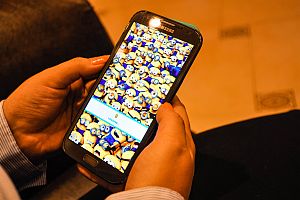Mobile Phone Addiction: What the Science Says

Only a few decades ago, telephones were relatively large objects that sat on a desk or a tabletop. Remember those? You picked them up when you needed to call someone, and you never really thought about them at other times, unless the telephone actually rang, indicating that someone was calling you. The very idea that someone could become addicted to a telephone (old-school references to teenage girls aside) would have seemed absurd.
But now, with our mobile phones giving us access not only to voice communications but also to the Internet, it’s quite a different story. In one study conducted by phone provider Gazelle, researchers found behavior that certainly sounds like addiction–-70% of users check their mobile phones compulsively within minutes of waking up, 51% check them while on vacation, and 44% admit to feeling extremely anxious and irritable if they CAN’T continually check their phones. Another study indicates that the average college student uses his or her smartphone for over nine hours a day—longer than most of those students spend sleeping! So it appears that describing modern Americans as addicted to their mobile phones is not hyperbole.
What does science say about mobile phone addiction?
It has been well established that people can become addicted to behaviors in much the same way they can become addicted to substances like drugs or alcohol or nicotine. Many mobile phone users, deprived of their phones for a few minutes, begin to show signs of withdrawal. For such people, losing their phone or having its battery die can literally provoke a panic attack. And research has suggested that this seeming addiction to one’s smartphone increases depending on how many apps one uses, especially email or social media apps. The study of college students mentioned earlier, for example, found that they spent an average of 94 minutes a day texting, 48 minutes sending emails, and 38 minutes checking Facebook.
Checking for messages and responding to them can definitely become a compulsion. One study by Atchley and Warden (published in the Journal of Applied Research in Memory and Cognition) offered students a “delayed gratification” test. They were told that they had received a text message from a significant other, and that they could either reply immediately and be paid $5, or wait several hours and be paid $100. Most chose to reply immediately.
Another study conducted in Spain found that over 40% of the young adults they tested spent more than four hours per day on their mobile phones, and that many of them felt so offended at not receiving an expected reply to a text or phone call immediately that they described their feelings as “deeply upset and sad.” This study also found that mobile phone addicts tended over time to neglect important responsibilities like studies or work in favor of time spent on their phones. Some subjects in the Spanish study, when deprived of their phones, displayed symptoms of “anxiety, irritability, sleep disorders or sleeplessness, and even shivering and digestive problems.”
It is important to remember that most of the studies cited in this article are preliminary, meaning that the results have not yet been replicated by follow-up studies. Thus while we can say that mobile phone use is associated with feelings and behaviors we can legitimately describe as signs of addiction, we can’t say for sure yet whether mobile phone use causes those feelings and behaviors. But the research is certainly pointing in that direction.
This is why it’s so important to be self-aware about how you use this technology! The next time you are at a party or in a restaurant and you find yourself communicating with your phone more often than you communicate with your family and friends, the reason may NOT be that your family and friends are boring. It may be that you have developed a few compulsive habits about your own mobile phone use that you might want to look into!